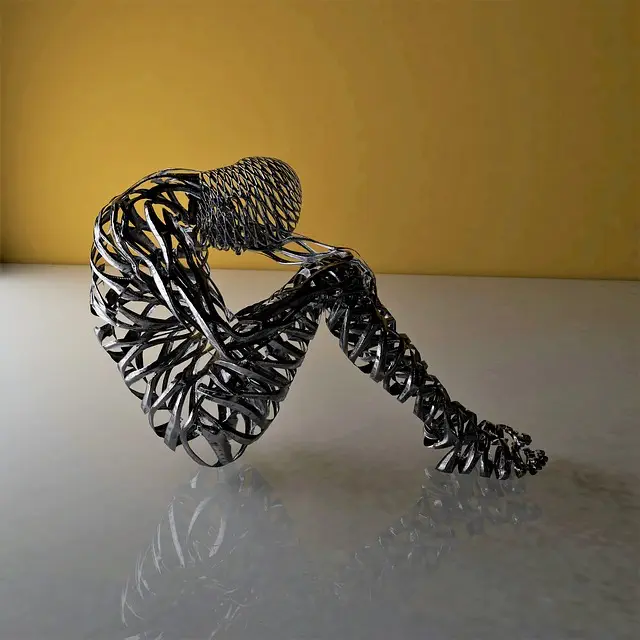Kratom, derived from Mitragyna speciosa leaves, has been explored as a natural remedy for anxiety-related muscle tension due to its alkaloids mitragynine and 7-hydroxymitragynine. These compounds engage with the brain's opioid receptors to potentially ease muscle relaxation and improve mood. While kratom shows promise for muscle relaxation and is used by some as a natural anxiolytic, it's important to approach its use with medical guidance due to individual physiological responses, dosage variations, and potential side effects. The integration of kratom into a comprehensive treatment plan, under the supervision of healthcare providers, can help manage anxiety disorders effectively and safely. Additionally, a balanced approach that combines kratom with other stress-reduction techniques like mindfulness, exercise, nutrition, and good sleep habits is recommended for optimal results. Personalization and careful dosing are essential to harness the benefits of kratom for muscle relaxation while mitigating any adverse effects.
Exploring the intricate relationship between kratom and its potential for muscle relaxation offers valuable insights into managing anxiety disorders. This article delves into the therapeutic properties of kratom, particularly its effects on muscular tension often associated with these conditions. By integrating kratom within a holistic treatment approach, individuals may find relief from the physical manifestations of anxiety. Join us as we navigate the scientific evidence and practical applications of kratom in alleviating the discomfort caused by anxiety-related muscle tightness, emphasizing its role in overall wellness strategies.
- Unraveling the Connection Between Kratom and Muscle Relaxation for Anxiety Disorder Management
- Navigating the Therapeutic Properties of Kratom for Anxiety and Its Impact on Muscular Tension
- Integrating Kratom into a Holistic Approach for Managing Anxiety-Related Muscle Tension
Unraveling the Connection Between Kratom and Muscle Relaxation for Anxiety Disorder Management

Kratom, a plant-based substance derived from the leaves of Mitragyna speciosa, has garnered attention for its potential therapeutic effects, particularly in managing symptoms associated with anxiety disorders. One of the notable aspects of kratom’s action is its capacity to induce muscle relaxation, which can be highly beneficial for individuals suffering from anxiety-related tension and physical stress. The alkaloids present in kratom, such as mitragynine and 7-hydroxymitragynine, are thought to interact with the brain’s opioid receptors, leading to a modulation of neurotransmitters that can alleviate muscle rigidity often experienced by those with anxiety. This muscle relaxation effect can contribute to a general sense of well-being and comfort, which is crucial for individuals seeking respite from the physiological manifestations of their disorder.
Furthermore, the use of kratom as a natural supplement for muscle relaxation in anxiety management should be approached with caution. While anecdotal evidence and some research suggest its efficacy, it is not without potential side effects and regulatory considerations. The optimal dosage can vary significantly between individuals, and long-term use may lead to dependency or other health issues. It is imperative for those considering kratom as a component of their anxiety disorder support strategy to consult with healthcare professionals. A comprehensive approach that includes medical guidance, evidence-based therapies, and holistic practices can provide the most effective and safe management of anxiety disorders. Understanding the nuances of how kratom interacts with one’s unique physiology is key to harnessing its potential benefits while mitigating risks.
Navigating the Therapeutic Properties of Kratom for Anxiety and Its Impact on Muscular Tension

Kratom, a tropical evergreen tree native to Southeast Asia, has garnered attention for its potential therapeutic properties, particularly in the realm of managing anxiety and alleviating muscular tension. The mitragynine and 7-hydroxymitragynine alkaloids found within kratom leaves are believed to interact with the brain’s receptors, influencing mood regulation and providing a sense of calm. Users often report that kratom helps in modulating anxiety symptoms, offering a natural alternative to synthetic anxiolytics. Beyond its psychological effects, kratom is also recognized for its ability to induce muscle relaxation. The analgesic qualities of kratom can be beneficial for individuals experiencing acute or chronic muscular tension, which is commonly associated with stress and anxiety disorders. It’s important for those considering kratom as a supplementary aid in their wellness regimen to consult healthcare professionals, given the nuanced relationship between kratom use and individual health conditions. The impact of kratom on muscle relaxation should be carefully balanced with its potential effects on mental clarity and energy levels, as these can vary depending on the strain and dosage. Proper dosing and monitoring are crucial for safely harnessing kratom’s benefits for anxiety management and muscular tension relief.
Integrating Kratom into a Holistic Approach for Managing Anxiety-Related Muscle Tension

When exploring holistic approaches for managing anxiety-related muscle tension, kratom has emerged as a potential therapeutic option due to its alkaloid content which may influence muscle relaxation and mood regulation. Kratom, derived from the leaves of Mitragyna speciosa, is known for its diverse effects on the body, with specific strains offering sedative properties that can help alleviate muscular tension. Users often report a sense of calm and relaxation following kratom consumption, which can be particularly beneficial for those experiencing heightened states of anxiety. It’s important to approach the integration of kratom into an individual’s wellness regimen with caution, as its efficacy and appropriate dosing can vary widely among users. Consultation with a healthcare provider is essential to navigate potential benefits and risks associated with kratom use.
Incorporating kratom into a holistic anxiety management plan should be complemented by other stress-reducing practices. This multifaceted approach may include mindfulness techniques, regular exercise, balanced nutrition, and adequate sleep hygiene. These complementary strategies work synergistically with kratom to enhance its muscle relaxation effects, thereby creating a more comprehensive support system for individuals dealing with anxiety-related conditions. It’s crucial to tailor such an approach to the individual’s unique needs and circumstances, ensuring that each component of care is carefully selected and monitored over time. This personalized attention can optimize the benefits of kratom while minimizing potential adverse effects, leading to a more balanced and healthy lifestyle.
In conclusion, the therapeutic potential of kratom in supporting individuals with anxiety disorders, particularly through its effects on muscle relaxation, presents a promising avenue for holistic management. The intricate relationship between kratom’s active compounds and their impact on muscular tension provides a foundation for further research into effective, integrative treatment strategies. As the scientific community continues to explore this intersection, it is clear that kratom holds significant promise in the realm of anxiety disorder support, offering hope for those seeking alternative or complementary methods to alleviate their symptoms. It is essential, however, that any use of kratom be approached with caution and under professional guidance to ensure safety and efficacy.






